BIEsoud is a new online trading platform established in mid-2024, offering high-leverage accounts and attractive spreads. However, the lack of transparency, unverified regulatory claims, and similarities to known scam sites suggest potential risks that warrant caution. This article will take a deep dive into BIEsoud’s corporate background, registration details, and questionable website design. We’ll assess its regulatory claims, account features, and why these factors could pose significant risks for investors.
1. Background Overview: BIEsoud’s Origins and Structure
BIEsoud is a newly established trading platform, with its website registered on June 13, 2024. It claims to offer services ranging from forex and commodities to other financial trading products through its platform, accessible at biesoud.com. Despite these claims, BIEsoud lacks transparency on key aspects, such as its physical address or headquarters location.
In an industry where transparency is paramount, credible trading platforms provide visible and verifiable company information, including addresses and legal compliance details, to instill trust and accountability. This lack of transparency from BIEsoud is an immediate red flag, as legitimate platforms prioritize building investor confidence through openness. Without this information, potential investors are left with few assurances of the platform’s legitimacy and stability.
2. Domain Registration and Risks: What Does the Domain Reveal?
2.1 Key Domain Registration Details
The BIEsoud domain was registered on June 13, 2024, indicating that it is a recent entrant in the trading industry. The platform’s new status and lack of operating history may introduce higher risks, as there are no established records of user experience or performance to assess its reliability. In contrast, established trading platforms with longer histories have built trust through transparent business practices and accumulated user feedback.
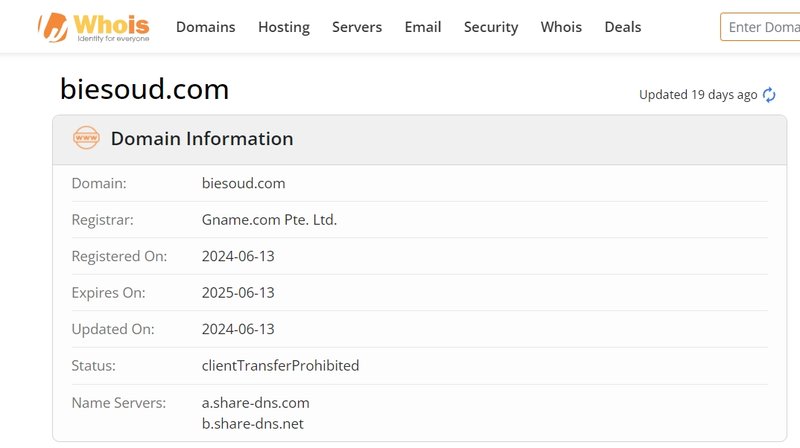
2.2 The Risks of New Trading Domains
Newly registered domains without a proven track record often lack user evaluations, which makes it difficult for potential investors to gauge the platform’s performance or credibility. Many scam websites frequently re-register new domains after brief operational periods to evade accountability or detection. BIEsoud’s recent registration, combined with the absence of transparent information, suggests that it may not prioritize long-term operations or accountability.
3. The Missing Entity: Lack of Company Address and Transparency
3.1 Lack of Public Address Information
BIEsoud has not disclosed any verifiable corporate address or physical office location on its website. A legitimate trading platform is typically transparent about its base of operations, regulatory status, and address. For instance, many reputable trading platforms in the financial services industry publish their registered addresses as a standard practice to ensure regulatory compliance and build investor trust.
3.2 Potential Implications of Not Providing a Verified Address
The absence of a verified address raises concerns about BIEsoud’s operational legitimacy. With no physical address available, investors would struggle to locate the company or hold it accountable if issues arise. In cases of fraud, for instance, the lack of traceable information limits the ability to pursue any legal recourse, leaving investors unprotected and exposed to potential loss.
4. Regulatory Claims and Reality: Unverified Licenses
4.1 BIEsoud’s Claimed Regulatory Oversight
BIEsoud claims to be regulated by two major regulatory bodies: the Australian Securities and Investments Commission (ASIC) and the Vanuatu Financial Services Commission (VFSC). The platform cites an ASIC Financial Services License (ASFL: 296805) and a VFSC registration number (700455) on its website, ostensibly to establish legitimacy and trustworthiness. However, these claims do not hold up under scrutiny.
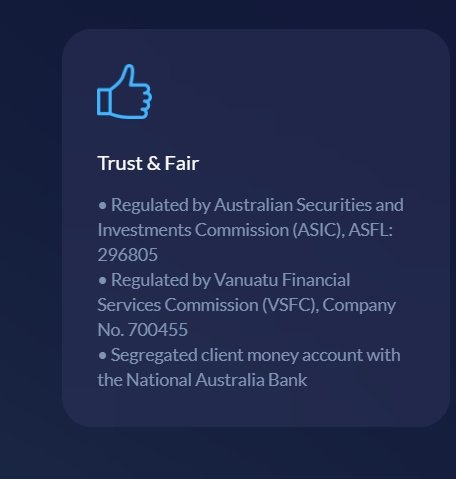
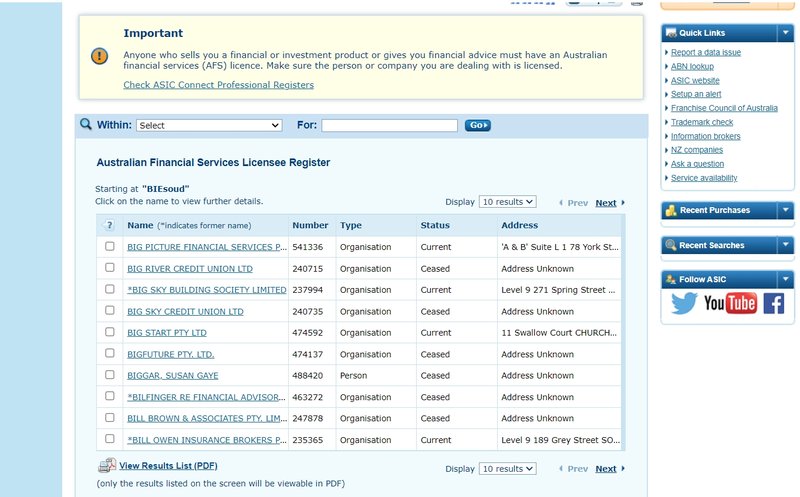
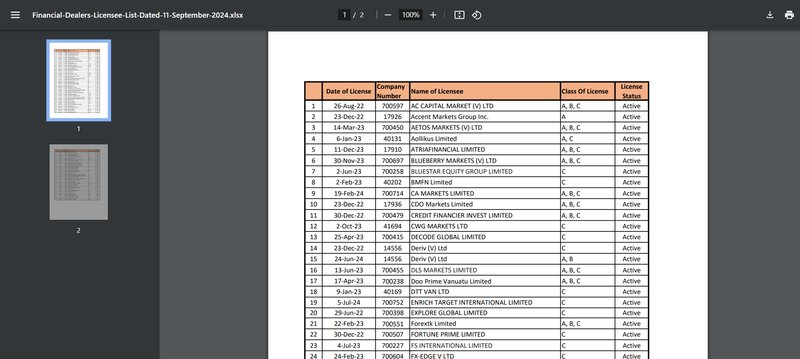
4.2 The Truth Behind BIEsoud’s Regulatory Claims
Upon verification, both the ASIC and VFSC license numbers provided by BIEsoud were found to be false. No credible regulatory oversight exists for BIEsoud. Many scam platforms commonly use fake regulatory numbers to create an illusion of legitimacy, misleading investors. Without authentic regulation, BIEsoud lacks oversight from authorities that enforce compliance standards, transparency, and financial accountability. Regulatory oversight also helps protect investor funds through mandated safety protocols. BIEsoud’s lack of real oversight could put investors at serious risk, as there is no assurance that their funds are secure or accessible if issues arise.
4.3 Why Regulation is Crucial in the Trading Industry
Regulatory oversight serves as a safeguard for investors, providing a framework of transparency, accountability, and legal recourse. Regulatory bodies enforce stringent standards that trading platforms must follow, from fund segregation to periodic audits. For investors, choosing a regulated platform is vital to ensure fund security and accountability. With no real regulation, BIEsoud falls short of these critical standards, amplifying potential risks for anyone considering it as a trading platform.
5. Web Design Similarities: BIEsoud’s Potential Connection to Scam Platforms
5.1 Suspicious Design Resemblance to Known Scam Sites
BIEsoud’s website design closely mirrors that of other scam-suspected platforms, such as WIN HG Limited. BIEsoud and WIN HG Limited share nearly identical layouts, color schemes, and feature placement, down to the smallest details. Such a high level of similarity suggests that BIEsoud may be using a template recycled by scam groups, which raises further concerns about its credibility.
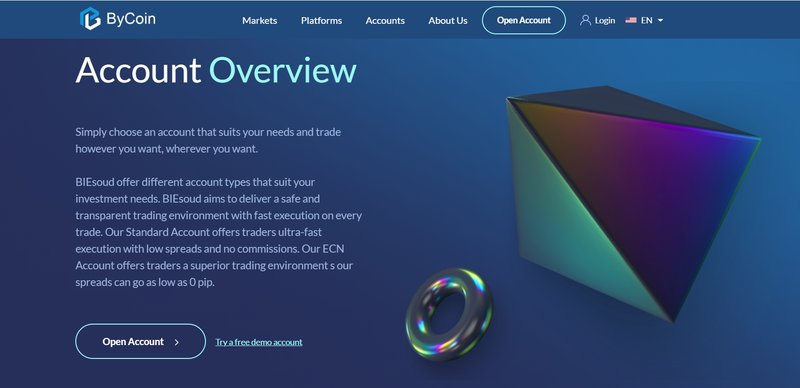
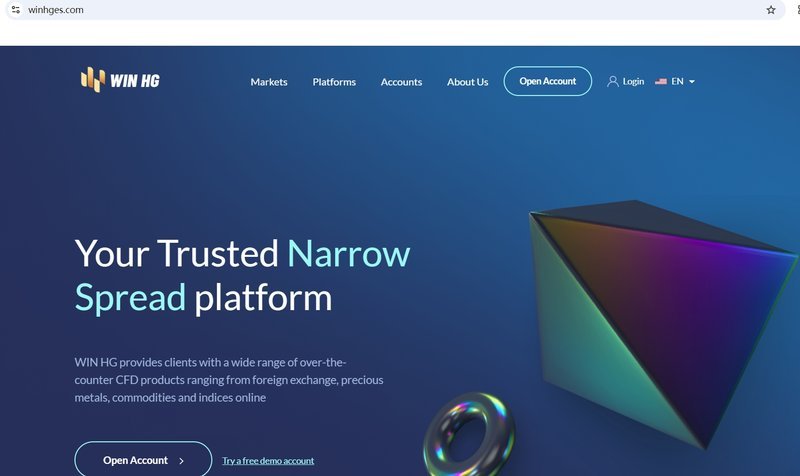
5.2 What the Design Similarities Could Indicate
Duplicated web designs often signal a lack of originality, especially when a trading platform claims to operate independently. Scam groups often employ this tactic to create multiple identical websites under different names, drawing in unsuspecting investors. Established platforms, on the other hand, typically invest in unique designs to differentiate themselves and offer a seamless user experience. BIEsoud’s apparent use of a standardized scam template, rather than a customized design, undermines its claims of authenticity and uniqueness, suggesting it could be linked to fraudulent activity.
6. Spread and Leverage Risks: High Risks for High Rewards?
6.1 BIEsoud’s Account Types and Leverage
BIEsoud offers two primary account types—Standard and ECN:
- Standard Account: Leverage up to 500:1, spreads starting from 1 pip, with no commission, and a minimum deposit of $200.
- ECN Account: Leverage also up to 500:1, spreads from 0.0 pips, but with a $6 commission per trade.
These high-leverage options may attract traders seeking greater profit margins. However, trading on a platform without regulatory oversight exposes investors to significant risk. High leverage, especially without regulatory safeguards, increases the chances of substantial losses in volatile markets. Without external oversight, BIEsoud’s high leverage limits also raise questions about its risk management protocols and whether it has the necessary capital reserves to support leveraged trading.
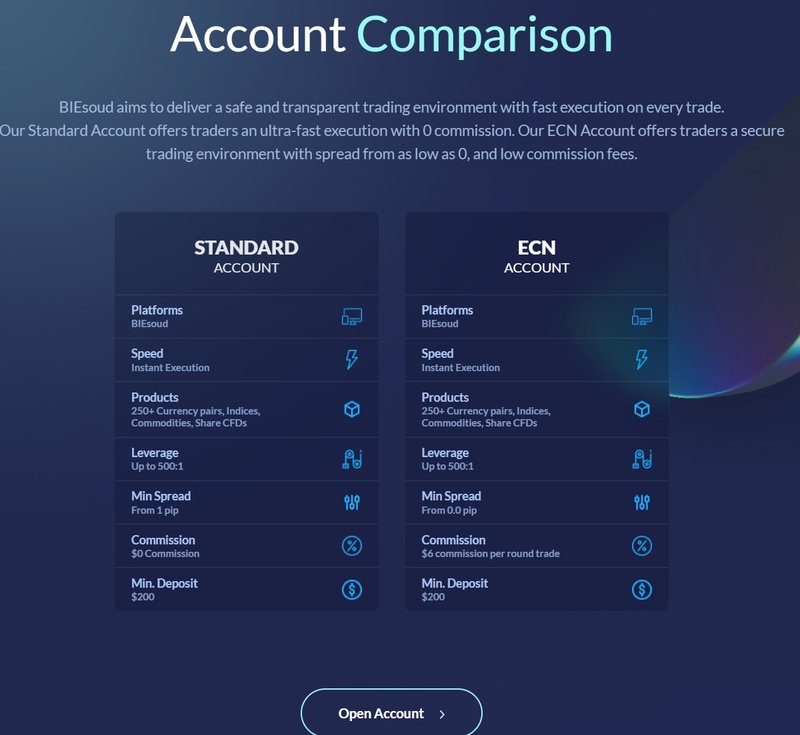
6.2 Risks of High Leverage on Unregulated Platforms
High leverage increases the potential for both high returns and steep losses, making it a double-edged sword. Trading platforms regulated by bodies like ASIC or the FCA impose leverage caps to protect traders from excessive losses. However, BIEsoud’s lack of real regulation means it is not required to follow such rules, making high leverage even riskier for investors. Without regulatory requirements for fund segregation or leverage limits, investors on BIEsoud could face devastating losses without any recourse.
7. What is a Reasonable Minimum Deposit? Examining BIEsoud’s Requirements
7.1 BIEsoud’s Minimum Deposit Requirements
BIEsoud’s minimum deposit for a Standard Account is $200, which may seem affordable to entry-level traders. However, given the platform’s lack of regulation, unverified address, and suspicious design, any deposit amount could be at risk. A legitimate platform would typically provide investor protection mechanisms, but BIEsoud offers no such guarantees.
7.2 What is a Safe Minimum Deposit on a Trading Platform?
For new or cautious investors, starting with minimal deposits on reputable, regulated platforms is advisable. Without proper regulation and transparency, depositing funds on unverified platforms increases the likelihood of loss. For any trading platform, regulatory protection is key to ensuring that deposits are protected, and funds are accessible at all times. BIEsoud’s unregulated status raises serious concerns about the safety of even a minimal deposit.
8. Conclusion: Is BIEsoud a Safe Choice for Investors?
BIEsoud’s lack of a verified address, false regulatory claims, suspicious website design, and unregulated high-leverage offerings make it a highly questionable choice for investors. These red flags suggest that BIEsoud may lack both the transparency and regulatory support essential for a secure trading environment. Investors considering BIEsoud should exercise extreme caution, as the platform shows signs of high risk and lacks credibility.
9. FAQ
1. Is BIEsoud regulated by any legitimate financial authority?
No, despite its claims, BIEsoud is not regulated by ASIC or VFSC. Regulatory numbers on its website are fabricated, making it an unregulated platform.
2. What is the minimum deposit required to start trading on BIEsoud?
The minimum deposit for a Standard Account is $200, but given the platform’s lack of regulation, even this amount could be at risk.
3. How much leverage does BIEsoud offer?
BIEsoud offers leverage up to 500:1, which is unusually high and risky, especially for an unregulated platform lacking protective oversight.
4. Does BIEsoud provide a verified company address?
No, BIEsoud does not list a verifiable company address, which raises doubts about its legitimacy.
5. Why is website design similarity to scam platforms a red flag?
Scam groups often reuse website templates across multiple platforms. BIEsoud’s resemblance to known scam sites suggests it may not be independently operated.
6. What risks are associated with unregulated trading platforms?
Unregulated platforms are not legally bound to follow standards that protect investor funds, increasing the likelihood of fraud and loss.



